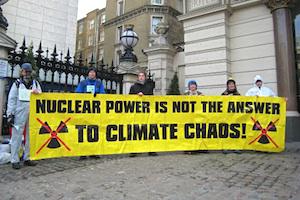If you’ve read the GMB press release following the passing of composite motion 2 at TUC congress on Sunday, you would think the labour movement is on the verge of leading the charge for a nuclear renaissance, writes Sam Mason
 Far from it. Clearly some unions backed it with enough weight to get it carried, but a sizeable number did not including PCS, CWU, UCU, TSSA, RMT and Unison.
Far from it. Clearly some unions backed it with enough weight to get it carried, but a sizeable number did not including PCS, CWU, UCU, TSSA, RMT and Unison.
A few weeks ago, following the release of the IPCC report on climate change, the UN Secretary General Antonio Guterres said this was “code red for humanity”. The GMB say if we are “serious about the climate emergency and a green economic recovery” we must invest in new nuclear. Why?
Of course the immediate answer is jobs. Having thought we’ve moved on from the jobs versus environment dilemma, we need to be honest, this is the same debate dressed in new greenwashed clothes. The same greenwash that global corporations and governments are masquerading with their net zero decarbonisation targets. This is because whether it’s nuclear, blue hydrogen or carbon capture and storage this is about perpetuating the some energy economics and social relations of the current system. One that is not rooted in justice and least of all climate justice.
Nuclear also does not fit into a neat category like fossil fuels. It does not pollute in terms of nitrous oxides and air pollutants, there are high levels of health and safety and risk controls, jobs tend to be highly skilled, well paid and unionised. It’s seen as an abundant ‘clean’ fuel, and essential for baseload generation which can help stabilise the power grid and can keep on radiating when the sun doesn’t shine and the wind doesn’t blow. Many of these arguments were made in the debate.
In terms of decarbonisation and grid stabilisation, then the first problem is that it displaces or slows the transition to a fully renewable energy generation. This is particularly important at a time when costs for renewables are decreasing but for nuclear, they remain high, and as highlighted in the motion, there is no agreed financing model. The time cost is also critical when comparing the ‘build rate’ of capacity compared to renewables. Finally the low carbon notion is founded on the ‘point of delivery’ rather than lifecyle carbon costs including extraction, construction and waste disposal.
Whilst there is general consensus about the high levels of protections and unionisation for workers in the nuclear sector, this is becoming contested, particularly around the future workforce and increasing levels of exposure to health and safety risks. There are also increasing attacks on other worker terms and conditions such as pensions, and breaking of collective agreements in training and skills. And last but certainly not least, the cross reference of civilian nuclear to the defence sector.
If the answer is rooted in jobs however, then surely we should not be calling for perpetuation of an industry that can only survive on heavy public subsidy and fixed prices for overseas companies whose profits will be made from consumer power bills. Even if we accepted nuclear power as part of a publicly owned power system, is that really where we want to sink public investment when we could be creating more jobs, affordable energy and reduce demand through mass retrofit and other programmes.
As we run up to the COP26 climate talks in Glasgow, climate justice has to be at the heart of every decision we make as a labour movement. For communities in the UK and particularly in the global south. Decisions that are rooted in our internationalism and solidarity, and for this alone, nuclear has no place.
In 2011, the Fukushima disaster in Japan displaced thousands from their homes and lands became contaminated. On the 10th anniversary this year, the Mirrar clan in Australia who are fighting uranium extraction on their traditional lands sent a powerful message of solidarity that should be read ahead of every nuclear debate:
The impacts of the nuclear industry are felt for generations of people in every place it operates. Here in Kakadu the legacy of uranium mining is all too evident, and we are deeply saddened to learn of the ongoing and increasing impacts of the failed reactors on the people and country of Japan. Ten years on: Kakadu Traditional Owners remain saddened by ongoing Fukushima disaster – The Gundjeihmi Aboriginal Corporation (katalyst.com.au)
We cannot mitigate against every eventuality but we can avoid climate solutions that bring the greatest risks. This means stopping building any more nuclear power plants such as Sizewell C on a coastline threatened with sea level rise, and adding to the already unresolved nuclear waste legacy for future generations.
Our movement does needs comprehensive plan but we won’t get one with nuclear in the mix. Instead let’s build one based on public services that protects current and future generations in the UK and globally, rooted in justice and solidarity. Until we can agree on this then we remain in our own movement climate crisis and that won’t create or protect anyone’s job.


